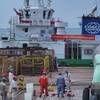Legal Beat: Criminal Enforcement in the Marine Industry: The Latest Trends
By Jeanne M. Grasso and Allison L. Fennell
The Lay of the Land - or Sea
In the past several years, federal prosecutors increasingly have devoted time and resources to pursuing vessel owners, operators, crewmembers, and shoreside employees who are involved in illegal discharges at sea. Discharges at sea have long been recognized as a serious threat to the marine environment and, as a result, there is a plethora of laws in the United States regulating discharges into waters of the United States. These statutes include the Clean Water Act, the Refuse Act, the Oil Pollution Act of 1990, the Act to Prevent Pollution from Ships (APPS) (implementing the International Convention for the Prevention of Pollution from Ships or MARPOL), and the Ocean Dumping Act, among others. The government also has been aggressively pursuing companies and individuals using additional theories of liability, including false statements, conspiracy, and obstruction of justice, where the underlying issue is an alleged environmental violation, but jurisdiction is questionable because the underlying conduct occurred on the high seas.
In the 1970s, environmental prosecutions were largely administrative and civil. With the onset of the 1980s, criminal enforcement of environmental laws became commonplace, but predominantly against shore-based facilities, and largely included "midnight dumping" and other similar egregious behaviors. In the 1990s and into the 21st century, the marine industry became the target through the Department of Justice's (DOJ) "Vessel Initiative."
In the early 1990s, U.S. authorities began using APPS to bring criminal charges against the operators of foreign-flag vessels that illegally discharged plastics into the U.S. exclusive economic zone. APPS also was used to bring criminal charges against operators of U.S.-flag vessels for illegal discharges of oily bilge water on the high seas. However, because APPS did not provide jurisdiction for the United States to prosecute foreign-flag vessels for discharges of oily bilge water beyond U.S. territorial waters, and because violations of MARPOL occurring on the high seas should generally be referred to the vessel's flag state for enforcement, the United States got creative. Unable to find a basis for jurisdiction under MARPOL and APPS, prosecutors charged the first oil-water separator bypass cases as violations of the federal False Statements Act (FSA), 18 U.S.C. § 1001. The theory was that the intentional entering of incorrect data in oil record books, which are required by MARPOL and APPS, to conceal illegal discharges constituted false statements made to the government when the oil record books were presented to the Coast Guard in U.S. ports. Thus, even though the underlying conduct, i.e., the illegal discharge of oily bilge water on the high seas, did not provide criminal jurisdiction for an environmental prosecution, the attendant "false statement" in the oil record book, once presented to the Coast Guard, did.
This trend, which began in the mid to late 1990s with the DOJ's Vessel Initiative, has been gaining momentum ever since. Thomas Sansonetti, Assistant Attorney General for DOJ's Environment and Natural Resources Division, when asked in late 2002 how long the Vessel Initiative would continue, replied that it would remain a DOJ priority until the "number of referrals dwindles to zero." Clearly, the prosecutions have not dwindled to zero since that statement.
History on Environmental Prosecutions and the Marine Industry
In 1998, in one of the leading illegal discharge cases, Royal Caribbean Cruise Line (RCCL) pled guilty in Miami and San Juan to conspiracy, false statements, obstruction of justice, and APPS violations related to illegal discharges and paid a $9 million fine. This was the first prosecution of a foreign-flag vessel under the FSA resulting from inaccurate oil record book entries. Shortly thereafter, Holland America Line (HAL) pled guilty to similar violations and paid a $2 million fine. The HAL prosecution marked the first time a shoreside manager was prosecuted for shipboard violations. In this prosecution, a crewmember was rewarded under the APPS whistleblower provision, which allows awards of up to one half of the assessed penalty amount, for providing information to the government leading to a conviction. Several months later in 1999, RCCL again pled guilty, this time in six jurisdictions, for dumping waste oil and contaminated gray water, and for lying to the Coast Guard, and paid an additional $18 million fine.
Numerous vessel-related prosecutions occurred over the next few years for illegal discharges, but the effort in 2002 was unsurpassed. During 2002, there were ten "overall" prosecutions, of which two involved cruise lines and eight involved cargo ships. These ten prosecutions in 2002 resulted in more than $25 million in fines ($18 million of which was attributed to Carnival Corporation alone) and 21 guilty pleas - ten for corporations and 11 for individuals. Nine of the 11 individuals were either detained in the United States pending resolution of the case or went to jail for up to one year. All of these prosecutions involved false statements, obstruction of justice, or conspiracy, generally related to falsification of the oil record book. One of these cases marked the first time that a corporate board member was charged for his role in a conspiracy involving vessel pollution. Another milestone in 2002 is that, for the first time, foreign crewmembers on foreign-flag vessels were sentenced to prison terms for their participation in violations.
The trend continued into 2003, when there were seven overall prosecutions for illegal discharges, over $4 million in fines, eight guilty pleas (five companies and three individuals), and jail terms of up to two years. Several indictments issued in 2003 are still pending in 2004. In addition to oil-water separator violations, an oil spill from the Star Evviva, and ocean dumping from the ferryboat Muskegon Clipper, were also prosecuted criminally in 2003. The owners of the Star Evviva pled guilty to discharging a harmful quantity of oil into the ocean and two of the ship's officers were charged with conspiracy to obstruct justice, making false statements, and violations of the Clean Water Act in connection with the oil spill. The captain of the Muskegon Clipper, who was convicted of conspiracy and violations of the Ocean Dumping Act and APPS, was sentenced to two years in prison, as he was the "person responsible" for dumping trash bags full of asbestos and renovation debris. Another 2003 prosecution involved Sabine Transportation, operator of a U.S.-flag cargo ship. Sabine pled guilty and paid $2 million in fines for the illegal dumping of waste materials, including oily water, oil-contaminated grain, and plastics, from the S.S. Juneau and S.S. Trinity, and for failing to maintain required records. To bring 2003 to a close, three senior cruise ship engineers employed by Norwegian Cruise Line (NCL) were indicted by a federal grand jury in Miami on charges of violating APPS for their role in falsifying log books to conceal the overboard dumping of waste oil from the S.S. Norway. These indictments stem from the same incident underlying NCL's guilty plea in 2002. The trend continues into 2004. In January, a shipping company, OMI Corporation, pled guilty to preparing false documents in an effort to cover up an illegal oil discharge from the Guadalupe and agreed to pay a $4.2 million fine (the captain and chief engineer on the Guadalupe had pled guilty in 2002 in a related case). In addition, the vessel owner and manager of the Spring Drake recently were charged with false statements and obstruction of justice, and the chief engineer was charged with false statements related to the illegal discharge of oily bilge water. And finally, most significantly and most recently, six senior officials from Sabine Transportation were indicted for their role in the illegal discharges, falsifying documents, and impeding the Coast Guard's investigation in a case stemming from Sabine's guilty plea in 2003. These six indictments involve the Chairman of the Board/Chief Executive Officer, President, Vice President for Operations, Pier Superintendent, Master, and Chief Officer.
There does not appear to be an end in sight for the marine industry. In addition to the indictments pending in 2004, there are ongoing criminal prosecutions in Washington, Oregon, California, Maryland, Florida, and South Carolina related to the illegal discharge of oily bilge water.
What's Next? - 2004 and Beyond
The government remains aggressive in its battle to stop pollution. The theories of liability used by the government are expanding, the number of prosecutions is rising, and targets commonly include companies and individuals - both shipboard and shoreside - and all vessel types, including cruise ships, cargo ships, tankers, and tugboats.
Moreover, penalties are increasing in severity, often including prison, and those targeted are increasingly more senior in the company. Prosecutors already have obtained significant fines and prison sentences using the FSA, and now have made known their intent to bring charges under APPS as well, which contains a bounty provision, thus encouraging disgruntled crewmembers to "blow the whistle." In several cases in 2003, federal prosecutors have taken the position that it is a crime under APPS to make an inaccurate entry in an oil record book, apparently with no requirement to present the oil record book to U.S. officials, because APPS requires vessels to maintain accurate oil record books and imposes criminal penalties for noncompliance. The expanding use of APPS to prosecute discharges by foreign-flag vessels in international waters raises serious questions bearing on international law and policy.
DOJ's Sansonetti has promised that federal prosecutors will continue to aggressively pursue individuals and companies for oil discharges at sea. In announcing an indictment in February 2004, Sansonetti said "[w]e are committed to bringing to justice those who seek to pollute our waters, lie to our government, and endanger our well being. Companies and individuals that navigate our waters should take note that we are keeping a watchful eye." There are a number of things that companies can do to help avoid being part of this trend.
Foremost is: to establish and implement a detailed environmental compliance plan and to train employees on that plan, giving someone an ownership interest in environmental compliance; to conduct regular audits and promptly correct deficiencies; and to create a system for confidential reporting and promptly address those concerns raised. Remember, bad things can happen to good companies - the key is being prepared to deal with those bad things.
About the authors
Jeanne M. Grasso, a Partner in the Maritime and White Collar Practice Groups at Blank Rome LLP, focuses on maritime and environmental law, including issues confronting facilities, vessels and cargo owners on an international, federal and state level. Her practice commonly includes conducting internal investigations, white collar defense matters, and compliance counseling. Allison L. Fennell, an Associate in Blank Rome LLP's White Collar Practice Group, focuses on environmental and white collar defense matters. Her experience includes internal investigations, interviewing witnesses and responding to subpoenas. They can be reached at [email protected] and [email protected], respectively.











